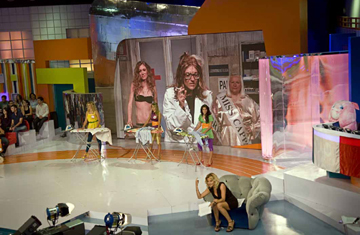
The popular TV show Quelli Che ... Il Calcio
(2 of 3)
Entertainment is central to the political genius of a man who started off as a crooner on a cruise line, and who christened his party Forza Italia after a national football chant. He's anything but gray. "When [former Prime Minister Romano] Prodi was on TV, I had to turn the sound way up," snorts one middle-aged Berlusconi supporter. "Prodi speaks like a priest." Ask an Italian what they think of their current leader, and chances are they'll chuckle — but most go on to say they voted for him. For many of his countrymen, Berlusconi's appetites are central to his appeal: "He is a real Italian," shrugs Alessio de Mitri, a youth coordinator for Berlusconi's party, now called Il Popolo della Libertà (PDL). "He likes to eat. He likes parties. He's going through a divorce, like a lot of people. He's going through company problems. He's really normal."
Sort of a normal superman — at least as his story is told on his own stations. Mediaset shows will tell you Berlusconi has boosted the economy, brokered peace in Georgia and built new houses for the victims of the 2009 L'Aquila earthquake, whereas the opposition would, as one Milanese Mediaset viewer quipped, "still be arguing about the density of the cement." When the Prime Minister handed out the keys of new homes to quake victims in September, two popular shows were bumped from other channels to avoid a clash. Italy is now the only country in Europe whose leader owns the media: Berlusconi's Mediaset stations, and his government's control of the state-owned RAI, means he has cornered 90% of the television market, in a country where an estimated 80% of the population gets its news from television. Criticizing Berlusconi can be costly. Since the stories about Letizia and alleged dalliances with prostitutes broke this summer, the newspaper La Repubblica has been covering them aggressively. The paper faces a libel suit from Berlusconi, as have foreign magazines and journalists who have criticized him in the past. "There are newspapers which have gone past the limits, have been too invasive of the Prime Minister's private life," says Carfagna.
Berlusconi's media empire began with the local TV station for Milano 2, a subdivision Berlusconi built outside of Milan when he was a young construction entrepreneur in the 1960s. A pioneer of private commercial television in Europe, he then sidestepped Italy's antimonopoly laws banning national private television by buying up scores of local stations. With assets spanning Italy's largest publishing company, an ad agency and the AC Milan football team, Berlusconi built up his Fininvest empire to become Italy's richest man. In 1993 he entered politics, declaring his newly launched party to be a "pole of liberty" — though for many, his sudden political awakening was a transparent effort to protect his own business interests.
There's little doubt of Berlusconi's appeal. In a country weary of political wrangling — it's on its 62nd government since the war — Berlusconi has successfully "tapped into nonpolitical sentiments," says Fabrizio Tonello, a political scientist at the University of Padua. Against the backdrop of the aspirational consumption shown on his television stations, Berlusconi's blend of ordinary Italian guyhood with the image of fabulously wealthy Don Juan is a potent one: "It's an entertainment culture," says Tonello, "the direct opposite of a political culture, in which only politicians who are celebrities can compete in the political market."
New Faces! New Ideas!
After Berlusconi, Mara Carfagna is Italy's biggest politico-celebrity. At a September conference in Cortina of Berlusconi's party, fans thronged to pose with the Equal Opportunities Minister as their friends clicked away furiously on digital cameras. "There is only one person in Italy who has had the courage to put young people and women in politics," said Carfagna. "Thank you, Berlusconi!" Where his opponents sneer at Carfagna's appointment as a crude appeal to Italy's libido, Berlusconiani see it as a democratizing act in a country that's been run by old men. "Carfagna is a strong sign that the PDL wants to change something," says Franco Vendramin, a silver-haired ad executive at the conference. "New people means new brains, new faces, who'll bring new approaches and new ideas." Carfagna herself, he grins, "is very nice." "He's just like Berlusconi," sighs his wife Daniela fondly.
